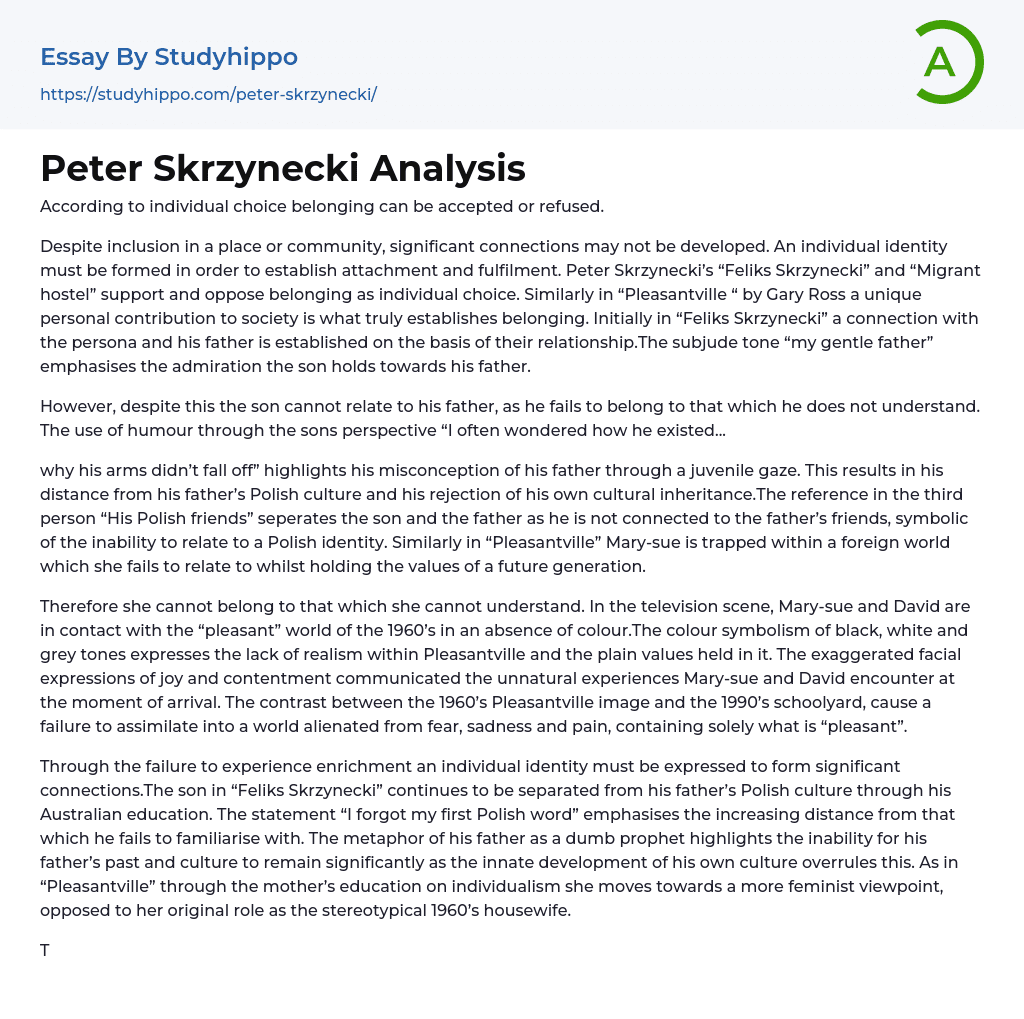Belonging can be accepted or refused depending on personal preference.
Although included in a place or community, it is possible to not develop meaningful connections without forming an individual identity. Peter Skrzynecki's "Feliks Skrzynecki" and "Migrant hostel" both explore and challenge the idea of belonging as a personal choice. Similarly, in Gary Ross's "Pleasantville", it is a unique personal contribution to society that truly establishes a sense of belonging. In "Feliks Skrzynecki", the persona's connection with his father is based on their relationship, emphasized by the admiration the son holds towards his "gentle father".
Notwithstanding, the son is unable to connect with his father because he cannot comprehend what he does not fit into. From the son's viewpoint, the humour is evident when he ponders, "I often wondered how he existed..."
The juvenile perspective in "why his arms didn't fall off" causes th
...e son to misunderstand his father and distance himself from Polish culture, rejecting his own inheritance. The use of "His Polish friends" also highlights this separation, indicating a lack of connection to a Polish identity. Similarly, in "Pleasantville," Mary-sue is trapped in an unfamiliar world that she cannot relate to, despite holding future values.
The inability to comprehend prevents someone from belonging. Pleasantville's TV scene features Mary-sue and David experiencing a "pleasant" context in the colorless world of the 1960s. The absence of color, depicted through black, white, and grey tones, reflects the unrealistic nature and uncomplicated values of Pleasantville. The exaggerated facial expressions showing joy and contentment demonstrate the unnatural encounters of Mary-sue and David upon their arrival. The stark contrast between the 1960s Pleasantville image and the 1990s schoolyard leads to failure in assimilation
into a world devoid of fear, sadness, and pain, where only that which is "pleasant" exists.
Expressing an individual identity is necessary to establish meaningful connections when enrichment is not achieved. In "Feliks Skrzynecki", the son's Australian education keeps him distanced from his father's Polish culture, as he forgets his first Polish word. The metaphor of his father as a dumb prophet illustrates how his own culture takes precedence over his father's past and culture. Similarly, in "Pleasantville", the mother's education on individualism causes her to adopt a more feminist perspective, departing from her previous role as a stereotypical 1960s housewife.
The husband's perceived power over women is portrayed through his elevated position in the composition, looking down on his wife. The contrasting coloring of the husband and wife further emphasizes her sense of disconnection from him and the importance of her personal growth. Contrastingly, belonging is an inherent need for survival as seen in "Migrant hostel". Here, the migrants are forced into a foreign environment and are instinctively drawn to their own nationalities. The emphasized language "Nationalities sought/Each other out instinctively" highlights the intense desire to belong. Assimilation into Australian culture is essential in order to achieve this sense of belonging as suggested through the phrase "whose track we would follow."
The symbolic image of “A barrier at the main gate” represents the hindrance to establishing connections with Australian society due to the citizens’ judgemental values. This analogous concept is also observed in “Pleasantville”, wherein David initially resists Mary-Sue’s efforts to introduce individuality into the town, but eventually chooses to conform to societal norms in order to find purpose. The scene where David (now Bud) applies
black and white makeup over his mother’s “coloured” individuality exemplifies his conformity to Pleasantville’s values. The mother’s coloured face represents her enrichment through self-discovery and individualism, though her initial fear of judgment from a conservative society stops her from embracing it completely.
The fear of judgement, triggered by the societal pressures to fit in, can compel an individual or cultural group to forfeit their values. In “Migrant hostel”, the gate is personified as an embodiment of Australian society that judges the ostracized migrants, rising and falling like a finger. The migrants seek its approval and acceptance due to their fear of judgement. The metaphorical connotation of “or we’re dying” underscores the crucial need for belonging in their existence.
David's action of pointing his arm towards the mother's eyes in Pleasantville's makeup scene symbolizes her perception of belonging to a group rather than embracing her individuality. The makeup serves as a seal, hiding her true values from those who fear differences within a conservative society. All four texts exhibit a fear of judgment towards individuality when the approach to belong is surrendered. Confidence in one's identity can lead to resistance against belonging that fails to bring fulfillment. This complex idea of belonging is portrayed in Peter Skrzynecki's "Feliks Skrzynecki" and "Migrant hostel" and Gary Ross' "Pleasantville".
- Women's Suffrage essays
- Women'S Rights essays
- Women Empowerment essays
- Sojourner Truth essays
- Abortion essays
- Abuse essays
- Animal Rights essays
- Animal Testing essays
- Assault essays
- Bullying essays
- Controversial Issue essays
- Crash essays
- Cyber Bullying essays
- Feminism essays
- Human Rights essays
- Immigration essays
- Inequality essays
- Poverty essays
- Prejudice essays
- Racism essays
- Torture essays
- Violence essays
- American Literature essays
- Between The World and Me essays
- Book Report essays
- Book Review essays
- Book Summary essays
- Books essays
- Character essays
- Coming of Age essays
- Dante's Inferno essays
- Everyday Use essays
- Flowers for Algernon essays
- Genre essays
- Greek Mythology essays
- Incidents in The Life of a Slave Girl essays
- Letter essays
- Literary Criticism essays
- Literary devices essays
- Literature Review essays
- Metaphor essays
- Myth essays
- Play essays
- Plot essays
- Poem essays
- Poetry Analysis essays
- Protagonist essays
- Reader essays
- Reason essays
- Rhetoric essays




